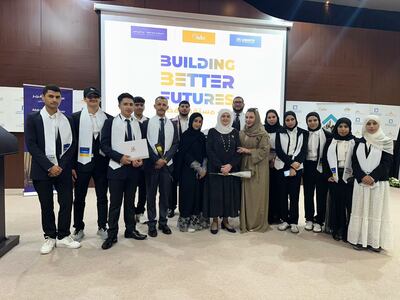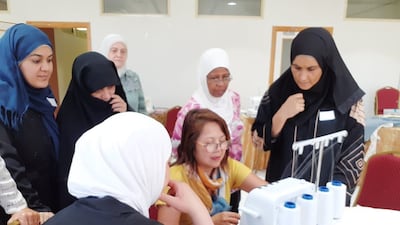Dozens of young people, many displaced by war, have been recognised in Abu Dhabi for completing vocational training programmes that have become a lifeline for low-income families across the Emirates.
The ceremony, held at Fatima College for Health Sciences on Friday, was the culmination of a project that began in response to the UAE’s 2018 amnesty for residents from war-affected countries such as Syria, Yemen, Palestine and Sudan.
At the time, the UN global refugee agency's office in the UAE registered 7,663 individuals as persons of concern and found that 80 per cent of children in the families were not going to school.
It saw the inception of the Basmat Amal initiative, which began referring the families with children who needed support for additional help. What began as an education programme for out-of-school children quickly grew into a community-wide support network.
“Every year, the Basmat Amal initiative supports between 85 and 185 students – children who have missed out on school,” May Kadkoy, director of the Lotus Holistic Retail Institute and a former UNHCR adviser, told The National. “But I didn’t want to just keep supporting them with charity. I wanted to create something sustainable.
“We helped mothers get licensed so they could sell their products and cover school fees,” she said. “Then we began vocational training for older siblings in digital marketing, graphic design and early childhood care. Out of 140 youth, 70 per cent are now working.”
Giving hope
Basmat Amal, which loosely translates to imprint of hope, is funded by the Abdul Aziz Al Ghurair Refugee Education Fund and implemented by the UNHCR and Lotus Holistic Retail Institute.
The Lotus Holistic Retail Institute, a registered training centre operating in Abu Dhabi, has now helped 455 people from war-torn countries access education and vocational training.
Of those, 175 children are now enrolled in school, 180 youths have completed vocational certifications, and 100 individuals are generating income through employment or microenterprise.
“We started by helping the children referred to us to access UAE schools, and this remains our goal,” said Maya Motlik, Head of Business Development at the Institute. “However, as the conflict continued, we have too many children who are eight year old, 12 years old with almost no education.”
The Ministry of Education of Syria collaborated with Unicef during the early years of the conflict to develop an online certified education system to help children displaced by war continue their education and catch up if they fell behind.
“We have been leveraging this system for remedial education and now are supporting 80 students in remedial education,” Ms Motlik said. “We work case by case. We assess paperwork, identify pathways – sometimes mainstream UAE schools, sometimes online Syrian curricula – and match students to available support.”
What the future holds
Among the long-time collaborators is Carla Bygrave, co-founder of Skills3, a social enterprise focused on women’s economic empowerment.
“We’re a profit-for-purpose organisation, and everything we do must have a social impact,” Ms Bygrave said. “Four years ago, we launched a sewing programme for the mothers of Amal students. We taught 20 women to sew using traditional skills like Sadu [a traditional Bedouin embroidery form], and helped them generate income.”
Skills3 now purchases their products outright and sells them through its own Social Souq platform. Items are available at the Sheikh Mohammed Centre for Cultural Understanding, Jumeirah Mosque’s gift shop, and Indigo Hotel in Dubai.
“I’ve seen these students grow up. I’ve seen their mothers gain confidence and financial independence,” said Ms Bygrave. “That’s why I’m here today – to keep supporting them.”
Five healthy carbs and how to eat them
Brown rice: consume an amount that fits in the palm of your hand
Non-starchy vegetables, such as broccoli: consume raw or at low temperatures, and don’t reheat
Oatmeal: look out for pure whole oat grains or kernels, which are locally grown and packaged; avoid those that have travelled from afar
Fruit: a medium bowl a day and no more, and never fruit juices
Lentils and lentil pasta: soak these well and cook them at a low temperature; refrain from eating highly processed pasta variants
Courtesy Roma Megchiani, functional nutritionist at Dubai’s 77 Veggie Boutique
The%20specs
%3Cp%3E%3Cstrong%3EEngine%3A%3C%2Fstrong%3E%201.8-litre%204-cyl%20turbo%0D%3Cbr%3E%3Cstrong%3EPower%3A%20%3C%2Fstrong%3E190hp%20at%205%2C200rpm%0D%3Cbr%3E%3Cstrong%3ETorque%3A%3C%2Fstrong%3E%20320Nm%20from%201%2C800-5%2C000rpm%0D%3Cbr%3E%3Cstrong%3ETransmission%3A%20%3C%2Fstrong%3ESeven-speed%20dual-clutch%20auto%0D%3Cbr%3E%3Cstrong%3EFuel%20consumption%3A%3C%2Fstrong%3E%206.7L%2F100km%0D%3Cbr%3E%3Cstrong%3EPrice%3A%3C%2Fstrong%3E%20From%20Dh111%2C195%0D%3Cbr%3E%3Cstrong%3EOn%20sale%3A%20%3C%2Fstrong%3ENow%3C%2Fp%3E%0A
SPECS
%3Cp%3EEngine%3A%20Supercharged%203.5-litre%20V6%0D%3Cbr%3EPower%3A%20400hp%0D%3Cbr%3ETorque%3A%20430Nm%0D%3Cbr%3EOn%20sale%3A%20Now%0D%3Cbr%3EPrice%3A%20From%20Dh450%2C000%0D%3Cbr%3E%3C%2Fp%3E%0A
Ammar 808:
Maghreb United
Sofyann Ben Youssef
Glitterbeat
Company%20profile
%3Cp%3E%3Cstrong%3EName%3A%3C%2Fstrong%3E%20Homie%20Portal%20LLC%3C%2Fp%3E%0A%3Cp%3E%3Cstrong%3EStarted%3A%3C%2Fstrong%3E%20End%20of%202021%C2%A0%3C%2Fp%3E%0A%3Cp%3E%3Cstrong%3EFounder%3A%20%3C%2Fstrong%3EAbdulla%20Al%20Kamda%C2%A0%3C%2Fp%3E%0A%3Cp%3E%3Cstrong%3EBased%3A%3C%2Fstrong%3E%20Dubai%3C%2Fp%3E%0A%3Cp%3E%3Cstrong%3ESector%3A%3C%2Fstrong%3E%20FinTech%C2%A0%3C%2Fp%3E%0A%3Cp%3E%3Cstrong%3EInitial%20investment%3A%3C%2Fstrong%3E%20Undisclosed%C2%A0%3C%2Fp%3E%0A%3Cp%3E%3Cstrong%3ECurrent%20number%20of%20staff%3A%3C%2Fstrong%3E%2014%C2%A0%3C%2Fp%3E%0A%3Cp%3E%3Cstrong%3EInvestment%20stage%3A%20%3C%2Fstrong%3ELaunch%C2%A0%3C%2Fp%3E%0A%3Cp%3E%3Cstrong%3EInvestors%3A%3C%2Fstrong%3E%20Self-funded%3C%2Fp%3E%0A
What is a robo-adviser?
Robo-advisers use an online sign-up process to gauge an investor’s risk tolerance by feeding information such as their age, income, saving goals and investment history into an algorithm, which then assigns them an investment portfolio, ranging from more conservative to higher risk ones.
These portfolios are made up of exchange traded funds (ETFs) with exposure to indices such as US and global equities, fixed-income products like bonds, though exposure to real estate, commodity ETFs or gold is also possible.
Investing in ETFs allows robo-advisers to offer fees far lower than traditional investments, such as actively managed mutual funds bought through a bank or broker. Investors can buy ETFs directly via a brokerage, but with robo-advisers they benefit from investment portfolios matched to their risk tolerance as well as being user friendly.
Many robo-advisers charge what are called wrap fees, meaning there are no additional fees such as subscription or withdrawal fees, success fees or fees for rebalancing.
Results
Men's finals
45kg:Duc Le Hoang (VIE) beat Zolfi Amirhossein (IRI) points 29-28. 48kg: Naruephon Chittra (THA) beat Joseph Vanlalhruaia (IND) TKO round 2.
51kg: Sakchai Chamchit (THA) beat Salam Al Suwaid (IRQ) TKO round 1. 54kg: Veerasak Senanue (THA) beat Huynh Hoang Phi (VIE) 30-25.
57kg: Almaz Sarsembekov (KAZ) beat Tak Chuen Suen (MAC) RSC round 3. 60kg: Yerkanat Ospan (KAZ) beat Ibrahim Bilal (UAE) 30-27.
63.5kg: Abil Galiyev (KAZ) beat Nouredine Samir (UAE) 29-28. 67kg: Narin Wonglakhon (THA) beat Mohammed Mardi (UAE) 29-28.
71kg: Amine El Moatassime (UAE) w/o Shaker Al Tekreeti (IRQ). 75kg: Youssef Abboud (LBN) w/o Ayoob Saki (IRI).
81kg: Ilyass Habibali (UAE) beat Khaled Tarraf (LBN) 29-28. 86kg: Ali Takaloo (IRI) beat Emil Umayev (KAZ) 30-27.
91kg: Hamid Reza Kordabadi (IRI) beat Mohamad Osaily (LBN) RSC round 1. 91-plus kg: Mohammadrezapoor Shirmohammad (IRI) beat Abdulla Hasan (IRQ) 30-27.
Women's finals
45kg: Somruethai Siripathum (THA) beat Ha Huu Huynh (VIE) 30-27. 48kg: Thanawan Thongduang (THA) beat Colleen Saddi (PHI) 30-27.
51kg: Wansawang Srila Or (THA) beat Thuy Phuong Trieu (VIE) 29-28. 54kg: Ruchira Wongsriwo (THA) beat Zeinab Khatoun (LBN) 30-26.
57kg: Sara Idriss (LBN) beat Zahra Nasiri Bargh (IRI) 30-27. 60kg: Kaewrudee Kamtakrapoom (THA) beat Sedigheh Hajivand (IRI) TKO round 2.
63.5kg: Nadiya Moghaddam (IRI) w/o Reem Al Issa (JOR).
The Bio
Favourite place in UAE: Al Rams pearling village
What one book should everyone read: Any book written before electricity was invented. When a writer willingly worked under candlelight, you know he/she had a real passion for their craft
Your favourite type of pearl: All of them. No pearl looks the same and each carries its own unique characteristics, like humans
Best time to swim in the sea: When there is enough light to see beneath the surface


